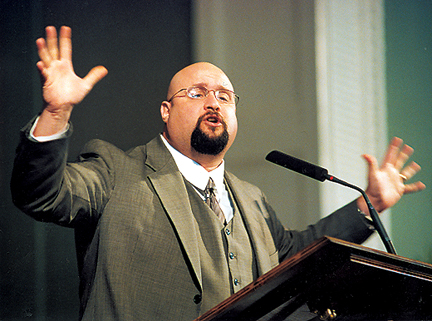
WAKE FOREST, N.C. (BP)–The current attack on the image of God as Father — a portrait seen as biased and sexist in some circles — assaults the very image of God and is a dangerous position, said Ergun Caner, professor of church history and theology at The Criswell College in Dallas.
Caner returned to his alma mater, Southeastern Baptist Theological Seminary, on Oct. 16 voicing strong rebuke of those who would eliminate gender-specific language of God, particularly the notion of God’s Fatherhood, because they say it is patriarchal and patronizing.
“They have missed the point,” Caner said. “Are we as evangelicals saying that God is a man? That’s not what we are saying. [Father] is not a biological term; it is a theological term.”
Caner is perhaps best known for a work he coauthored with his brother Emir Caner, a church history professor at Southeastern. The two wrote “Unveiling Islam,” which highlights the differences between the God of Christianity and Allah of Islam as seen by the brothers, who grew up as Muslims.
The contemporary debate over gender-neutral changes to Scripture is a debate that has simmered for centuries in the church, Caner said.
The difference today, he said, is that political correctness has begun to define the way some people interpret Scripture.
“We cannot allow political correctness to sap us of our strength and drain us of our joy,” Caner said. God as Father is “fundamentally essential” to the Christian faith, he said.
“To remove God as Father is to rob you and I as believers in Jesus Christ of our divine rights, our divine privileges and our divine standing,” he said. “God is Father in relation to his children, not in relation to his gender.”
The theological image of God, as presented in Romans 8:14-17, provides four basic truths of the Christian’s relationship to God, Caner said, each of which are indispensable.
The first, he said, is that God as Father binds his children together, providing a basis for Christian love and fellowship.
“Whether you like it or not, whether you recognize it or not, whether you revel in it or not, you and I are family … across this nation, across this state and around the world,” Caner said.
The second is that characteristic of Fatherhood that makes the God of Christianity distinct from the gods of so many other religions: the intimacy of Abba, Father.
Caner’s background in Islam provides him with a perspective on how God’s relationship with his children separates him particularly from Allah, the God of Islam.
When he was a Muslim, Caner said, “If someone would have turned to me and said, as our culture wants to say, that Allah, Jehovah, it’s the same god — as a Muslim, if I would have heard someone say that, I would have been offended.
“As a Christian, I find it blasphemous,” Caner continued. “[God] shares his name with no one.”
In Islam, Allah is creator and judge but not personally involved in a relationship with his creation, Caner said, while God the Father is intimate, personal and indwelling.
The third truth of God’s Fatherhood is that it means Christians have an inheritance, Caner said; more than children, Christians are heirs.
“Because he has promised to provide, you or I as his children never have to worry about our provision,” Caner said. “We just look to our provider. He has, as Father, bequeathed to us his inheritance.”
The fourth truth is that God, the Father, suffers alongside Christians and bears their burdens, Caner said.
“Why does he do that? Because he’s Father,” Caner said. “You may be lonely, but you’re never alone. You may be hurting, but it is never too much.
“He’s not only for you, he’s with you.”
Because of these four truths, and many others, any movement to remove the concept of Fatherhood from the Word of God robs Christians of the essence of Christianity.
“The Father is a theological concept that is a practical realization,” Caner said. “Take the Father out of the Bible, and you have nothing left but an emaciated, weak, unconcerned god, small ‘g.’ But your Bible and my Bible refers to him as Father because in relation to you and me, he cares about us.
“Is God a man? He’s more than a man; he’s more than a woman. God’s Father.”
–30–
(BP) photo posted in the BP Photo Library at https://www.bpnews.net. Photo title: FATHERHOOD THEOLOGY.














